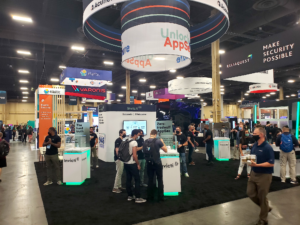SiliconANGLE article by Jason Bloomberg
The cybersecurity conference Black Hat roared back to Las Vegas last week in spite of a renewed mask mandate and a virtual event alternative. My mission: Uncover what’s next in the world of enterprise cybersecurity.
I spoke to a handful of promising vendors, asking each of them one basic question: “WTF?” As in: “Vendors have been delivering innovative cybersecurity solutions to enterprises for decades, but it seems that the situation is worse than ever. So: WTF?”
My interviewees had three basic answers to my provocative question. First, given the desperate cybersecurity skills shortage, it’s essential to rely even more on automation to address basic cybersecurity challenges.
Second, lateral movement within target victims’ networks is still a problem, but existing solutions such as microsegmentation are too difficult or inflexible. Third, artificial intelligence has to step up to the plate in a big way to address some of the basic cybersecurity challenges facing organizations today.
Here’s a look at how the cream of the crop of innovative vendors at Black Hat address these challenges.
Automating tasks that are impossible to handle manually
Combine the cyber skills shortage with the increasingly complex and dynamic enterprise information technology environments and automation becomes increasingly important.
AppOmni: Continuous security monitoring of the enterprise SaaS environment
AppOmni provides automation-based solutions that help enterprises that rely upon software-as-a-service applications to run their businesses. Apps such as Salesforce, ServiceNow, Workday, Slack and hundreds of others are mission-critical, and such enterprises will typically have thousands or tens of thousands of user accounts on each.
Each of these user accounts, in turn, has its own permissions. Similarly, every object, screen and table belonging to each SaaS apps has its own permissions and configurations. AppOmni keeps track of all of these permissions and configurations on behalf of its customers – even when they change.
Customers rely upon AppOmni to automatically handle such changes by ensuring conformance to their business intent. For example, the vendor can automate deprovisioning former employees, setting up and tearing down sales demos, handling promotions and reassignments, and dealing with mergers and acquisitions.



